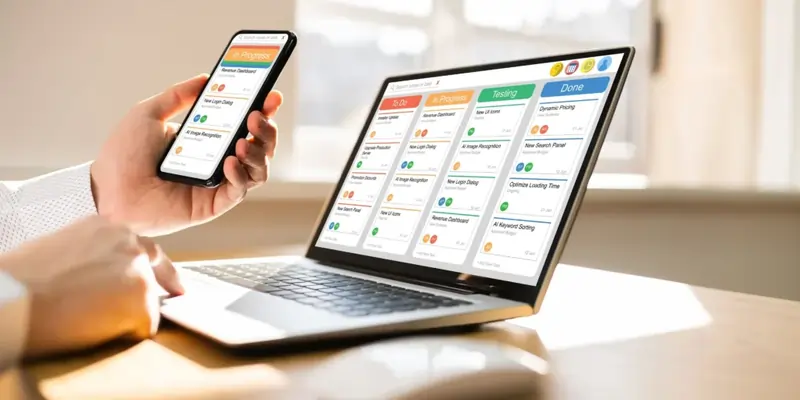
Key Takeaways
- UberEats clone app: It offers a cost-effective, customizable, and faster alternative to building a food delivery app from scratch.
- 7 essential steps: Market research, defining requirements, selecting a tech stack, designing UI, development, testing & deployment, and ongoing maintenance.
- Features include: Real-time order tracking, multiple payment gateways, ratings & reviews, customizable menus, and driver management.
- Benefits: Faster time to market, lower development costs, high scalability, and flexibility to match local market needs.
- Challenges: Competing with established apps, forming restaurant partnerships, ensuring a strong online presence, and offering contactless payments.
- Timeline and cost: Basic deployment of a clone script can take 5-6 weeks, but full customization, testing, and scaling typically require 3–6 months.
Want to launch your food delivery app like UberEats without the stress? Whether you run a restaurant, a cloud kitchen, or you’re just starting, having your app can help you reach more customers and grow faster.
The best part? You don’t need to know how to code or hire a big tech team. In this blog, we’ll cover 7 simple steps to help you build an UberEats clone app that’s easy to customize and ready to use.
Let’s get started and turn your food business idea into reality!
Trends and Statistics About UberEats
- 81% feel that Uber Eats is beneficial to their business’s financial health, according to Uber Eats.
- 26% of people who use food delivery services use UberEats.
- According to Business of Apps, Uber Eats generated $12.1 billion in revenue in 2023.
- UberEats is available in 11,000 cities worldwide in 2023.
- 73% of respondents had used Uber Eats in the past 12 months to order food.
- As of 2021, Uber Eats has a market share of 22% in the US food delivery service market.
- The Uber Eats app is available for download on the App Store and Google Play Store, where it is ranked third in the food and drink section.
UberEats Business Model
UberEats is an online food delivery platform that operates on a three-sided marketplace model, connecting customers and restaurants. Knowing how Uber Eats’ business model works is necessary.
Customer Ordering
Customers can download the UberEats app or visit the website to create an account. They can then enter their location, browse through a list of nearby restaurants, explore menus, and place their orders.
Restaurant Onboarding
UberEats partners with various restaurants, ranging from local eateries to popular chains. Restaurants interested in joining the platform go through a registration and onboarding process. This may involve signing contracts, providing necessary licenses, and agreeing to terms and conditions.
Delivery Partners
UberEats relies on a network of independent contractors, referred to as delivery partners or drivers, who use their vehicles to pick up orders from restaurants and deliver them to customers.
What is an UberEats Clone?
The UberEats clone is a food delivery app that connects users with nearby restaurants. It allows them to place orders by browsing menus and delivering food to their doorstep. It’s ideal for restaurant owners, community kitchens, cloud kitchens, entrepreneurs, and startups looking to start their own food delivery business.
The UberEats clone script has become a game-changer in the food delivery industry. You can use a readymade and reliable UberEats clone to materialize your online food delivery business.
Supercharge your deliveries with Enatega.
Register/a>Uber Eats vs. Uber Eats Clone App
The table below shows the key differences and similarities between Uber Eats and a clone app.
| Feature | Uber Eats | Uber Eats Clone App |
| Business Model | Established brand with global reach | Customizable to local markets |
| Revenue Model | Commission-based and delivery fees | It can vary based on the owner’s choice |
| Development Cost | High due to established infrastructure | Generally lower, varies by features |
| Market Reach | Global presence | Limited to specific regions |
| Customization | Limited to UberEats configurations | Highly customizable |
| Marketing | Strong brand recognition | Requires independent marketing efforts |
| Time to Market | Longer due to existing processes | Quicker with pre-built solutions |
How Does the UberEats Clone App Work?
Before starting to develop the app, it is crucial to understand the workflow of the food delivery clone app. The UberEats clone app works similarly to the original UberEats app.
Here is the process of how it works.
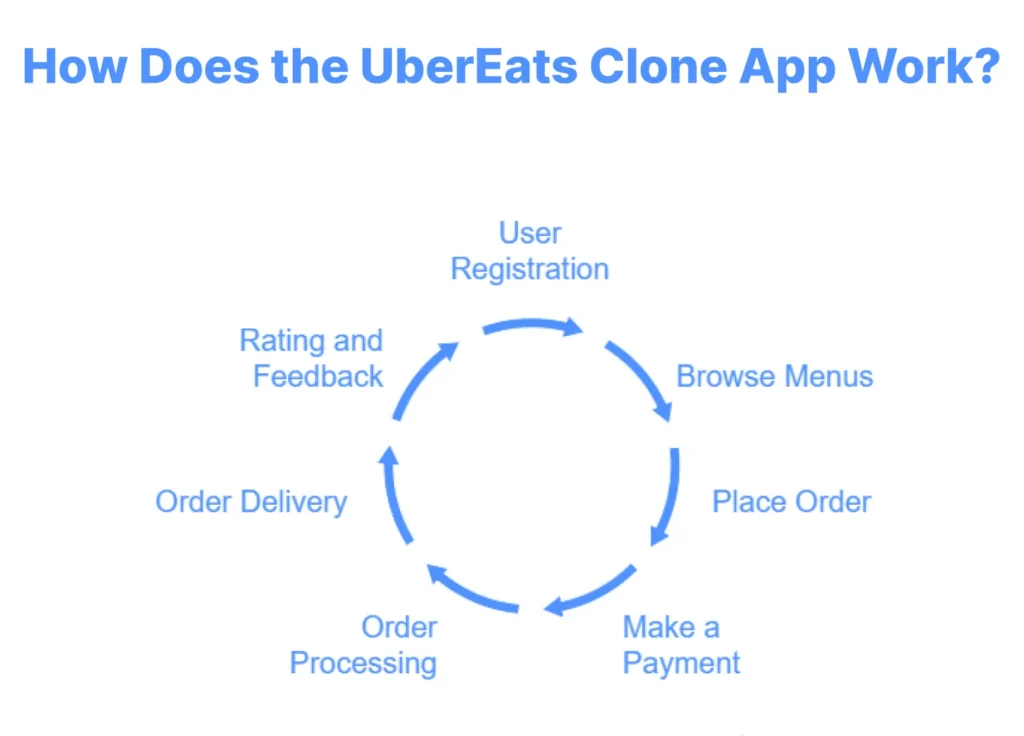
User Registration
Users can download the app and create an account on the app from their email address.
Browse Menus
The users browse menus from a list of restaurants, view prices, and read reviews before making their selection.
Place Order
When the user chooses a restaurant and selects the items, they add them to their cart and proceed to checkout.
Make a Payment
The users can pay through various payment methods, such as credit/debit cards, digital wallets, and more.
Order Processing
After receiving the order, the restaurant starts preparing the food. When the food is ready, the rider receives the notification.
Order Delivery
The assigned rider delivers the order to the specified address. Users and restaurants can track the order deliveries in real time from the app.
Rating and Feedback
The users can rate their experience after receiving their order. This helps restaurants maintain the quality of services and know customer preferences.
Key Features of UberEats Clone App
The success of the app relies on its features. It provides an opportunity to stand out from the competition. The UberEats clone app has the same features as the original app.
Here are some features of the clone app.
Customer App
| Features | Description |
| Menu Browsing | Customer ordering is easy with the help of this feature. The users can browse menus and select the food items of their choice. |
| Search Restaurants | This feature helps users search restaurants by cuisine, rating, delivery times, etc. |
| Alerts/Notifications | The notifications keep the users informed and keep them updated about their orders, offers, discounts, and new restaurants. |
| Multiple Payment Gateway Methods | The users can pay their food ordering bills through multiple payment methods. |
| Order Tracking | Allow users to track orders in real time from preparation to delivery. |
| Rating and Reviews | Allow users to rate restaurants and delivery riders that help others to make an informed decision. |
Restaurant App
| Features | Description |
| Menu Customization | The UberEats clone script allows restaurants to customize their menu according to their needs and customer preferences. |
| Notifications | The notifications notify the restaurants when the customer places an order. |
| Order History | Restaurants can check their order history and know which orders are delivered and pending. |
| Order Management | The restaurants can easily manage orders and deliver on time without hassle. |
| Payment Management | With this feature, the restaurants keep track of their payments. |
Rider App
| Features | Description |
| Registration | The riders can create their account on the app by submitting their documents and providing some basic information. |
| Order Notifications | On the food rider app, the riders receive notifications for the orders. |
| Order History | The riders check which orders they deliver and which are pending. |
| Check Reviews | Riders can check the reviews of the customers. |
Admin Panel
| Features | Description |
| Restaurant Management | Easily manage restaurants from the admin dashboard. The admin dashboard allows you to add or remove restaurants. |
| Ratings and Reviews | From the UberEats clone app admin, you can easily manage ratings and reviews. |
| Notifications | Manage emails, app notifications, and messages from a single platform. |
| Rider Management | Keep track of all the riders’ activities and their payments without difficulty. |
How to Make an App Like Uber Eats?
Developing a successful food delivery app is possible if you follow the proper steps. Therefore, for your help, we gathered some steps that help you in building the best app.
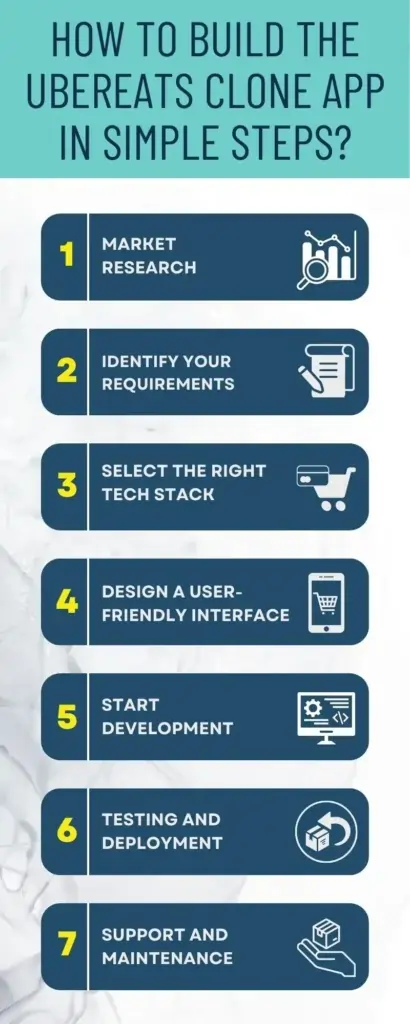
1. Market Research
The first step in creating a successful UberEats clone app is to do thorough research. Analyze your target market, identify their interest, determine your competitors, know the UberEats business model, and understand the latest trends in the food delivery industry.
This information will help you in creating the app, which will set it apart from other existing platforms.
2. Identify your Requirements
After doing your research, identify your requirements and list down the features that you need to include in your app. Make sure the features you add to your UberEats clone app are relevant to your target audience.
Some main features that you should include in your clone app are:
- User registration
- Order tracking
- Order history
- Secure payment methods
- Ratings and reviews
- Notifications
- Search and filter
3. Select the Right Tech Stack
The tech stack you choose plays a vital role in the scalability and performance of your app. Select the tech stack according to your app features. Plus, discuss with your development team to select the most suitable tech stack.
4. Design a User-Friendly Interface
Any app’s success depends on its user-friendly interface. Prioritize ease of use, clear navigation, and eye-catching graphics. It should be simple for customers to browse restaurants, choose food items, and place orders. Add visually appealing, eye-catching pictures of food items to make hungry clients want to place orders.
5. Start Development
In this step, start working on the frontend and backend development. Implement all the features that you need in your app in the UberEats clone app development. Make sure the app works well without any issues.
6. Testing and Deployment
The app must be tested when it is developed for any bugs or errors. Make the app error-free before deploying it on the app store.
7. Support and Maintenance
Continuing support is essential to guaranteeing that the clone app is free of bugs. This step requires you to complete the following tasks:
- Add additional features and functionalities to the app.
- Resolve any problems.
Benefits of UberEats Clone App
The UberEats app clone provides several benefits to customers and restaurants. Everything is easy with the clone app, from placing to tracking orders.
Here are some benefits that are provided by the UberEats clone app.
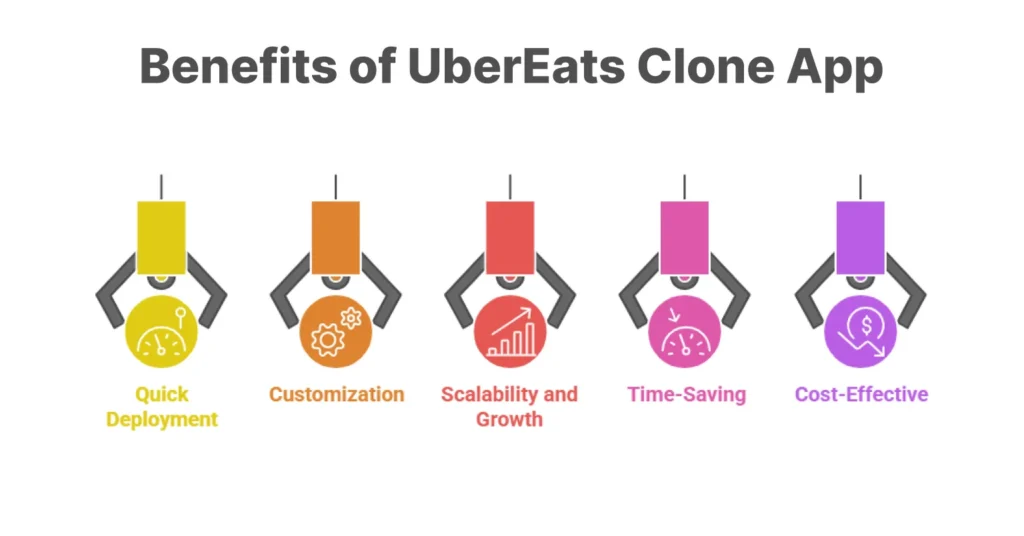
Quick Deployment
The UberEats clone script allows you to launch your food delivery service without the need for extensive development time and resources.
Customization
You can customize it according to your business needs. It helps you to create a custom food app that aligns with your brand.
Scalability and Growth
The clone app architecture is designed to accommodate growth and scalability. It allows businesses to expand their operations and reach new markets as they grow.
Time-Saving
You can save a lot of time and money when using the pre-built frameworks and features. Whether you’re running a small or large eatery, clone apps help you save money and time.
Cost-Effective
Building a food delivery app can be costly and time-consuming. The UberEats clone app offers a cost-effective alternative, minimizing initial investment while maximizing returns.
How Much Does it Cost to Create an UberEats Clone App?
The cost of developing the UberEats clone app depends on these factors, which include:
- App requirements and features
- Development platform
- Cost of third-party services
- Marketing and promotion
- Ongoing maintenance and support
By considering these factors, you can come up with an accurate cost estimate for your Uber Eats clone app.
Challenges to Face in Building UberEats Clone App
Here are some risks and challenges that business owners face in building the UberEats clone app.
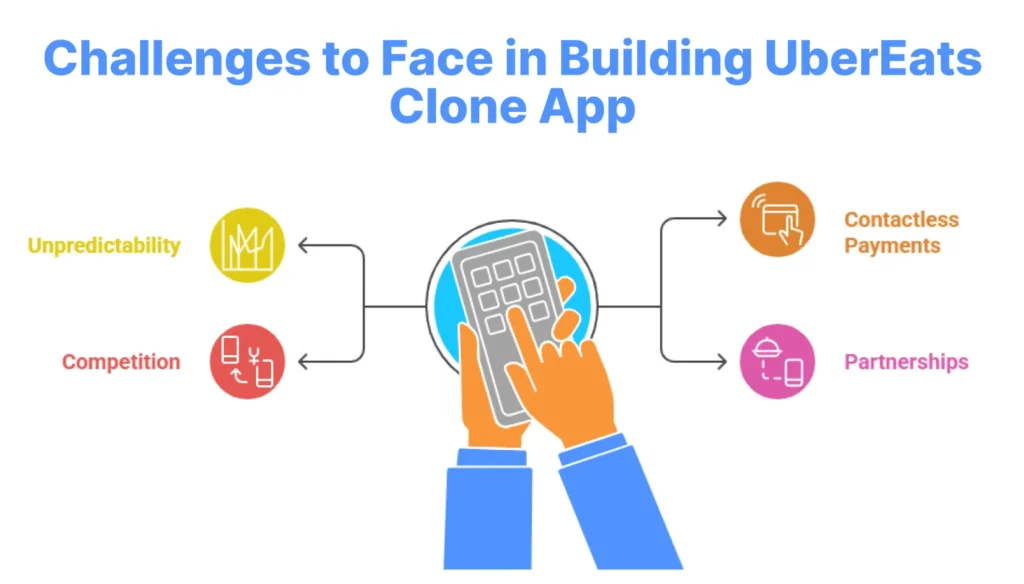
Unpredictability in Online Presence
Due to a lack of internet presence, customers lack interest in your company. To get people’s attention, you should make strong marketing strategies and promote your brand as much as possible.
Contactless Payments Are Not Available
Due to the new scenario, the manual payment system is deemed insecure. People prefer to pay online through their preferred payment methods. Therefore, provide all the payment methods to clients so they can use your app without difficulty.
Competition With The Original App
It is one of the big challenges that food business owners face. To compete with the original app is difficult, but if you make it better with advanced features and functionalities, there are more chances that people will use your app over your competitors.
Partnerships With Restaurants
Establishing partnerships with restaurants in real-time can be challenging. However, with smooth communication, you can easily partner with them.
Tips for UberEats Clone App Development
Below are some tips to help you in the UberEats clone app development phase.
- Clearly define the features and functionalities you want to include in your UberEats clone app.
- Research your target market and competition.
- Develop a well-thought-out business plan.
- Choose the business model that best meets your requirements.
- Select the features that make your app attractive to the users.
- Design a user-friendly interface that is easy to navigate and intuitive for both customers and restaurant owners.
- Implement real-time order tracking so that customers can track the progress of their orders and know when to expect delivery.
- Offer a variety of payment options to accommodate different customer preferences.
- Implement a system for managing delivery drivers.
FAQs
1. What is the main source of income for Uber Eats?
Uber Eats’ main income sources are commissions, delivery fees, advertising, and subscription programs.
2. Are there any other apps like Uber Eats?
Zomato, DoorDash, Grubhub, and Deliveroo are the apps that work like UberEats.
3. Who is Uber Eats’ main competitor?
DoorDash, Grubhub, Glovo, Swiggy, and Zomato are the main competitors of Uber Eats.
4. How long does it take to build an app like Uber?
Developing an app similar to Uber using a ready-made clone script can take as little as 5-6 weeks for basic deployment.
However, if you’re building a custom solution with unique features, advanced integrations, and scalability for large user bases, the development timeline usually ranges from 3 to 6 months, depending on complexity and requirements.
5. What are the key components of the Uber Eats business model?
Below are the key components of the UberEats business model.
- Commission fees
- Delivery fees
- Advertising partnerships
- Subscription programs
- Service fees
Supercharge your deliveries with Enatega.
Register/a>Conclusion
Developing the UberEats clone app for your food delivery business helps you expand your business. The clone apps help in organizing workflow and planning food delivery activities.
If you’re looking to build an UberEats alternative or clone apps, our food delivery app development company, Enatega, can help you bring your idea to life. With our expertise and commitment to quality, we can help you build a robust and scalable clone app that provides an exceptional user experience.
Book a free demo with us and explore how we can help you boost your sales and revenue in the food business.















 IOS
IOS Android
Android Web
Web




